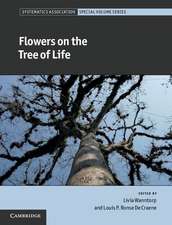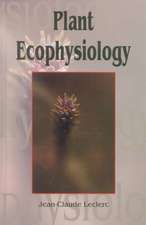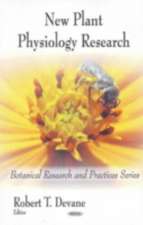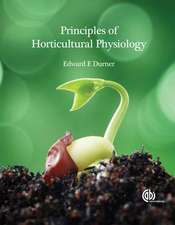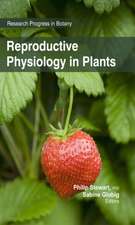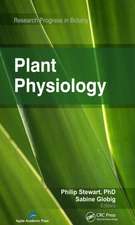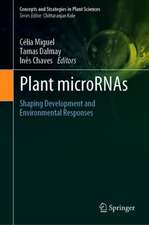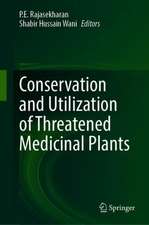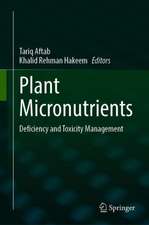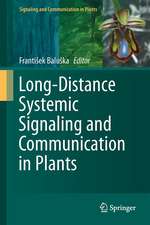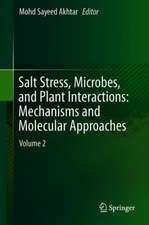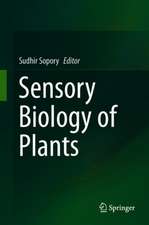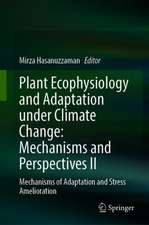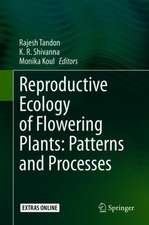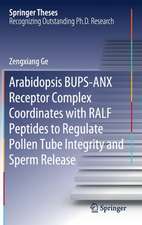Abiotic Stress Biology in Horticultural Plants
Editat de Yoshinori Kanayama, Alexey Kochetoven Limba Engleză Hardback – 27 ian 2015
Stress tolerance mechanisms in horticultural crops are gaining importance, because most agricultural regions are predicted to experience considerably more extreme environmental fluctuations due to global climate change. Further, because of recent progress in next-generation sequencing technologies, the postgenomic era is impending not only in model plants and major cereal crops but also in horticultural crops, which comprise a great diversity of species. This book provides information on the physiological aspects of the abiotic stress response in horticultural plants, which is considered essential for postgenomic research.
| Toate formatele și edițiile | Preț | Express |
|---|---|---|
| Paperback (1) | 555.18 lei 38-44 zile | |
| Springer – 6 oct 2016 | 555.18 lei 38-44 zile | |
| Hardback (1) | 643.34 lei 6-8 săpt. | |
| Springer – 27 ian 2015 | 643.34 lei 6-8 săpt. |
Preț: 643.34 lei
Preț vechi: 756.86 lei
-15% Nou
Puncte Express: 965
Preț estimativ în valută:
123.14€ • 133.80$ • 103.51£
123.14€ • 133.80$ • 103.51£
Carte tipărită la comandă
Livrare economică 21 aprilie-05 mai
Preluare comenzi: 021 569.72.76
Specificații
ISBN-13: 9784431552505
ISBN-10: 4431552502
Pagini: 220
Ilustrații: VIII, 220 p. 43 illus., 18 illus. in color.
Dimensiuni: 155 x 235 x 20 mm
Greutate: 0.5 kg
Ediția:2015
Editura: Springer
Colecția Springer
Locul publicării:Tokyo, Japan
ISBN-10: 4431552502
Pagini: 220
Ilustrații: VIII, 220 p. 43 illus., 18 illus. in color.
Dimensiuni: 155 x 235 x 20 mm
Greutate: 0.5 kg
Ediția:2015
Editura: Springer
Colecția Springer
Locul publicării:Tokyo, Japan
Public țintă
ResearchCuprins
PART I STRESS PHYSIOLOGY AND MOLECULAR BIOLOGY IN HORTICULTURAL PLANTS.- 1 Effect of Salt Stress on the Growth and Fruit Quality of Tomato Plants.- 2 Ethylene, Oxygen, Carbon Dioxide, and Temperature in Postharvest Physiology.- 3 Role of Polyamines in Stress Response in Horticultural Crops.- 4 Effect of Temperature on Fruit Color Development.- 5 Polyol Metabolism and Stress Tolerance in Horticultural Plants.- PART II EFFECTS OF ABIOTIC STRESS ON HORTICULTURAL CROP PRODUCTION AND STORAGE.- 6 Influence of Drought and High Temperature on Citrus.- 7 Fruit Set and Temperature Stress.- 8 Postharvest Chlorophyll Degradation and Oxidative Stress.- PART III STRESS BIOLOGY IN PHYSIOLOGICAL DISORDERS OF HORTICULTURAL CROPS.- 9 Blossom-End Rot in Fruit Vegetables.- 10 Watercore in Fruits.- 11 Water Uptake Through the Surface of Fleshy Soft Fruit: Barriers, Mechanism, Factors, and Potential Role in Cracking.- PART IV GENETIC ENGINEERING TECHNOLOGIES AND OMICS IN STRESS TOLERANCE.- 12 Promoters for Transgenic Horticultural Plants.- 13 mRNA Translational Enhancers as a Tool for Plant Gene Engineering.- 14 RNA-Seq Data Analysis for Studying Abiotic Stress in Horticultural Plants
Textul de pe ultima copertă
The purpose of this publication is to elucidate the biological aspect of the abiotic stress response from the field to the molecular level in horticultural plants. This book is unique in that it concerns the basic aspect of abiotic stress biology and research progress at the molecular level in model plants or major field crops, as it focuses mainly on the abiotic stress response in existing horticultural plants. Many readers interested in plant abiotic stress biology are aware of the application of the latest findings to agricultural production, and this book will have a special appeal for those readers. The book will be of interest to scientists and graduate students who are involved in the research, development, production, processing, and marketing of horticultural products, including those in developing countries who are interested in high tech and advanced science in this field. The application of the latest findings to agricultural production is particularly useful.
Stress tolerance mechanisms in horticultural crops are gaining importance, because most agricultural regions are predicted to experience considerably more extreme environmental fluctuations due to global climate change. Further, because of recent progress in next-generation sequencing technologies, the postgenomic era is impending not only in model plants and major cereal crops but also in horticultural crops, which comprise a great diversity of species. This book provides information on the physiological aspects of the abiotic stress response in horticultural plants, which is considered essential for postgenomic research.
Stress tolerance mechanisms in horticultural crops are gaining importance, because most agricultural regions are predicted to experience considerably more extreme environmental fluctuations due to global climate change. Further, because of recent progress in next-generation sequencing technologies, the postgenomic era is impending not only in model plants and major cereal crops but also in horticultural crops, which comprise a great diversity of species. This book provides information on the physiological aspects of the abiotic stress response in horticultural plants, which is considered essential for postgenomic research.
Caracteristici
Provides a detailed description of abiotic stress biology in horticultural crops from the field to the molecular level Includes the relationship between abiotic stress and physiological disorders and quality improvement as a unique phenomenon in horticultural crops Discusses the latest findings mainly with regard to major fruit crops in which readers worldwide are interested Includes supplementary material: sn.pub/extras

